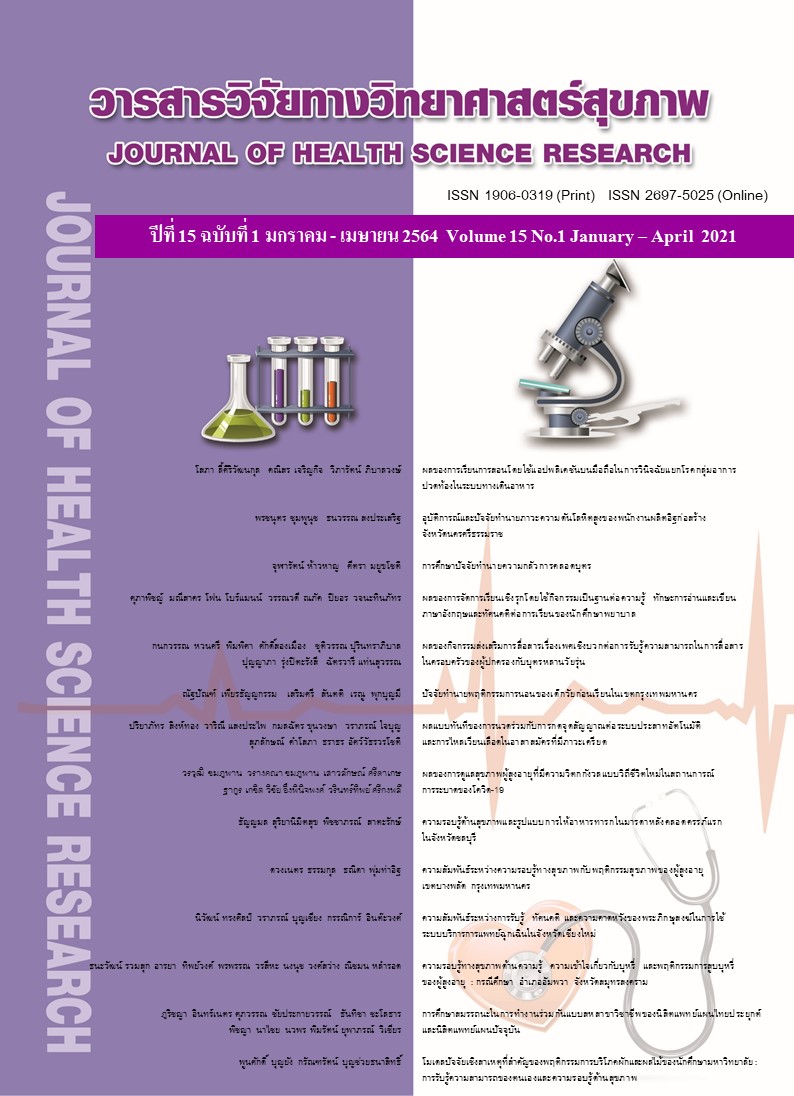การศึกษาสมรรถนะในการทำงานร่วมกันแบบสหสาขาวิชาชีพของ นิสิตแพทย์แผนไทยประยุกต์ และนิสิตแพทย์แผนปัจจุบัน
Main Article Content
บทคัดย่อ
บทนำ : ปัจจุบันมีนโยบายสนับสนุนการพัฒนาความร่วมมือทางการแพทย์ของแต่ละวิชาชีพ การจัดการเรียนรูปแบบสหสาขาวิชาชีพ เป็นแนวทางหนึ่งในการพัฒนาบุคลากรวิชาชีพสุขภาพที่เน้นการมีส่วนร่วม และความเข้าใจในบทบาทหน้าที่
วัตถุประสงค์การวิจัย : เพื่อศึกษาสมรรถนะในการทำงานร่วมกันแบบสหสาขาวิชาชีพของนิสิตแพทย์แผนไทยประยุกต์และนิสิตแพทย์แผนปัจจุบันที่ผ่านการเรียนการสอนแบบสหสาชาวิชาชีพ
วิธีการวิจัย : การวิจัยเชิงสำรวจแบบตัดขวาง ตัวอย่างคือนิสิตแพทย์แผนไทยประยุกต์ ปีการศึกษา 2562 ชั้นปีที่ 3 จำนวน 48 คน และนิสิตแพทย์แผนปัจจุบัน ชั้นปี 5 จำนวน 16 คน ที่เข้าร่วมการเรียนรู้แบบสหวิชาชีพ เป็นระยะเวลา 3 สัปดาห์ โดยใช้แบบประเมินสมรรถนะในการทำงานร่วมกันแบบสหสาขาวิชาชีพ ผลประเมิน 5 ด้าน ในสามช่วงเวลา คือ ก่อน หลังทันที และหลังกิจกรรม 1 ปี วิเคราะห์ข้อมูลด้วยสถิติเชิงพรรณา และเปรียบเทียบระหว่างกลุ่มด้วยการทดสอบแมน-วิทนีย์ยู
ผลการวิจัย : นิสิตทั้งสองสาขามีค่าเฉลี่ยสมรรถนะในการทำงานร่วมกันแบบสหสาขาวิชาชีพก่อนทำกิจกรรมอยู่ในระดับปานกลาง หลังการเรียนรู้ทันที และหลังเรียนรู้ 1 ปี เปลี่ยนแปลงเป็นอยู่ในระดับดี และมีค่าเฉลี่ยที่สูงขึ้นในแต่ละช่วงเวลา โดยนิสิตทั้ง 2 สาขามีค่าเฉลี่ยสมรรถนะด้านความเข้าใจหน้าที่และความรับผิดชอบเพิ่มขึ้นมากที่สุดอย่างมีนัยสำคัญทางสถิติ (p<.01) และเมื่อเปรียบเทียบค่าเฉลี่ยด้านอื่นๆ พบว่า มีค่าเฉลี่ยที่สูงขึ้นตามช่วงเวลาแต่ไม่มีความแตกต่างกัน
สรุปผล : นิสิตทั้งสองสาขามีสมรรถนะในการทำงานร่วมกันแบบสหสาขาวิชาชีพเพิ่มขึ้น ทำให้เข้าใจหน้าที่และความรับผิดชอบในการดูแลผู้ป่วย ซึ่งช่วยลดความขัดแย้งในการทำงานระหว่างวิชาชีพ
Downloads
Article Details
บทความที่ได้รับการตีพิมพ์เป็นลิขสิทธิ์ของวิทยาลัยพยาบาลบรมราชชนนี จังหวัดนนทบุรี
ข้อความที่ปรากฏในบทความแต่ละเรื่องในวารสารวิชาการเล่มนี้เป็นความคิดเห็นส่วนตัวของผู้เขียนแต่ละท่านไม่เกี่ยวข้องกับวิทยาลัยพยาบาลบรมราชชนนี จังหวัดนนทบุรี และคณาจารย์ท่านอื่น ในวิทยาลัยฯ แต่อย่างใด ความรับผิดชอบองค์ประกอบทั้งหมดของบทความแต่ละเรื่องเป็นของผู้เขียนแต่ละท่าน หากมีความผิดพลาดใด ๆ ผู้เขียนแต่ละท่านจะรับผิดชอบบทความของตนเองแต่ผู้เดียว
เอกสารอ้างอิง
Kooariyakul A, Intarakumhang Na Raachasima S, Wanchai A, Theinkaw S, Aryuwat S, Praphainthara P, et al. Students’ Experiences while Attending Inter-Professional Education (IPE) Activities: A Qualitative Study. The Southern College Network Journal of Nursing and Public Health. 2020;7(3):155-67 (in Thai).
Chuengsatiansup G, Suksuth P, Thantiphidok Y, Krudmeechai S, Kruppasat K. Policy for the Development of Thai traditional medicine, traditional medicine and alternative medicine in entering the Asean community. [internet]. 2014 [cited 2019 Sep 20]; Available from: https://kb.hsri.or.th/dspace/handle/11228/4212?locale-attribute=th. (in Thai).
Putthasri W, Chuenkongkaew W. The report on 3rd annual national health professional education reform forum: ANHPERF "IPE towards Thai Health Team". Nonthaburi: P.A Living Ltd; 2017. (in Thai).
Sirilak S, Nori T. Future health workforce Planning in Thailand. Putthasri W, Chuenkongkaew Y. editor. “IPE towards Thai Health Team” The report on the 3rd Annual National Health Professional Education Reform Forum: ANHPERF. 2016. Nonthaburi: P.A Living Ltd; 2017. p.36-8. (in Thai).
Schmitz CC, Radosevich DM, Jardine P, MacDonald CJ, Trumpower D, Archibald D. The Interprofessional Collaborative Competency Attainment Survey (ICCAS): A replication validation study. J Interprof Care. 2017;31(1):28-34. doi: 10.1080/13 561820.2016.1233096.
Suriyanimitsuk T, Reunreang T, Seubyart E, Patnattee K, Yimyong A. Results Of Interprofessional Education (IPE) on Health Promotion in Pregnant Women for Interprofessional Collaborativecompetency Attainment. Jornal of The Police Nurses. 2020;12(2):380-7. (in Thai).
Sethasathien S. A model of interpersonal education (IPE) in Department of Physical Medicine and Rehabilitation, Udonthani Hospital. ASEAN Journal of Rehabilitation Medicine. 2015;25(2):65-70. (in Thai).
Herge EA, Hsieh C, Keats P Waddell-Terry T. (2015). A Simulated Clinical Skills Scenario to Teach Interprofessional Teamwork to Health Profession Students. J Med Educ and Curric Dev. 2015;2:27–34. doi: 10.4137/JMECD.S18928.
Homeyer S, Hoffmann W, Hingst P, Oppermann RF, Dreier-Wolfgramm A. Effects of interprofessional education for medical and nursing students: enablers, barriers and expectations for optimizing future interprofessional collaboration - a qualitative study. BMC Nurs. 2018;17:13. doi: 10.1186/ s12912-018-0279-x.PMID:29643742;PMCI D: PMC5891914.
Wong AH, Wing L, Weiss B, Gang M. Coordinating a team response to behavioral emergencies in the Emergency Department: A Simulation-Enhanced Interprofessional Curriculum. West J Emerg Med. 2015;16(6). doi: 10.5811/ west jem.2015. 8.26220.


